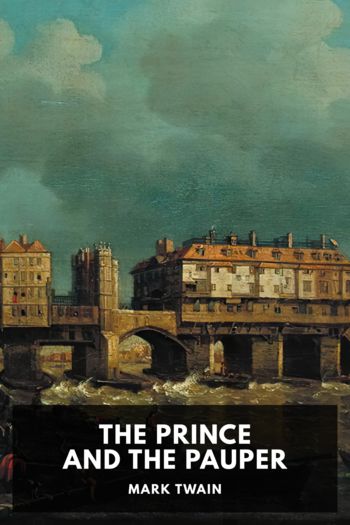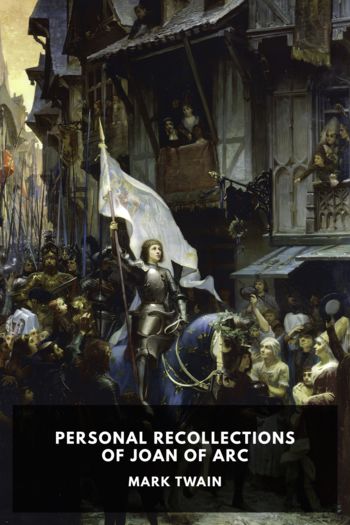The Prince and the Pauper by Mark Twain (i can read with my eyes shut txt) 📕

- Author: Mark Twain
Book online «The Prince and the Pauper by Mark Twain (i can read with my eyes shut txt) 📕». Author Mark Twain
“Bide a moment, good sir, there is none in hearing, and I would say a word to thee.”
“My duty forbids it, sir; prithee hinder me not, the night comes on.”
“Stay, nevertheless, for the matter concerns thee nearly. Turn thy back a moment and seem not to see: let this poor lad escape.”
“This to me, sir! I arrest thee in—”
“Nay, be not too hasty. See thou be careful and commit no foolish error,”—then he shut his voice down to a whisper, and said in the man’s ear—“the pig thou hast purchased for eightpence may cost thee thy neck, man!”
The poor constable, taken by surprise, was speechless, at first, then found his tongue and fell to blustering and threatening; but Hendon was tranquil, and waited with patience till his breath was spent; then said—
“I have a liking to thee, friend, and would not willingly see thee come to harm. Observe, I heard it all—every word. I will prove it to thee.” Then he repeated the conversation which the officer and the woman had had together in the hall, word for word, and ended with—
“There—have I set it forth correctly? Should not I be able to set it forth correctly before the judge, if occasion required?”
The man was dumb with fear and distress, for a moment; then he rallied, and said with forced lightness—
“ ’Tis making a mighty matter, indeed, out of a jest; I but plagued the woman for mine amusement.”
“Kept you the woman’s pig for amusement?”
The man answered sharply—
“Nought else, good sir—I tell thee ’twas but a jest.”
“I do begin to believe thee,” said Hendon, with a perplexing mixture of mockery and half-conviction in his tone; “but tarry thou here a moment whilst I run and ask his worship—for nathless, he being a man experienced in law, in jests, in—”
He was moving away, still talking; the constable hesitated, fidgeted, spat out an oath or two, then cried out—
“Hold, hold, good sir—prithee wait a little—the judge! Why, man, he hath no more sympathy with a jest than hath a dead corpse!—come, and we will speak further. Ods body! I seem to be in evil case—and all for an innocent and thoughtless pleasantry. I am a man of family; and my wife and little ones—List to reason, good your worship: what wouldst thou of me?”
“Only that thou be blind and dumb and paralytic whilst one may count a hundred thousand—counting slowly,” said Hendon, with the expression of a man who asks but a reasonable favor, and that a very little one.
“It is my destruction!” said the constable despairingly. “Ah, be reasonable, good sir; only look at this matter, on all its sides, and see how mere a jest it is—how manifestly and how plainly it is so. And even if one granted it were not a jest, it is a fault so small that e’en the grimmest penalty it could call forth would be but a rebuke and warning from the judge’s lips.”
Hendon replied with a solemnity which chilled the air about him—
“This jest of thine hath a name, in law—wot you what it is?”
“I knew it not! Peradventure I have been unwise. I never dreamed it had a name—ah, sweet heaven, I thought it was original.”
“Yes, it hath a name. In the law this crime is called Non compos mentis lex talionis sic transit gloria mundi.”
“Ah, my God!”
“And the penalty is death!”
“God be merciful to me a sinner!”
“By advantage taken of one in fault, in dire peril, and at thy mercy, thou hast seized goods worth above thirteenpence ha’penny, paying but a trifle for the same; and this, in the eye of the law, is constructive barratry, misprision of treason, malfeasance in office, ad hominem expurgatis in statu quo—and the penalty is death by the halter, without ransom, commutation, or benefit of clergy.”
“Bear me up, bear me up, sweet sir, my legs do fail me! Be thou merciful—spare me this doom, and I will turn my back and see nought that shall happen.”
“Good! now thou’rt wise and reasonable. And thou’lt restore the pig?”
“I will, I will indeed—nor ever touch another, though heaven send it and an archangel fetch it. Go—I am blind for thy sake—I see nothing. I will say thou didst break in and wrest the prisoner from my hands by force. It is but a crazy, ancient door—I will batter it down myself betwixt midnight and the morning.”
“Do it, good soul, no harm will come of it; the judge hath a loving charity for this poor lad, and will shed no tears and break no jailer’s bones for his escape.”
XXV Hendon HallAs soon as Hendon and the king were out of sight of the constable, his Majesty was instructed to hurry to a certain place outside the town, and wait there, whilst Hendon should go to the inn and settle his account. Half an hour later the two friends were blithely jogging eastward on Hendon’s sorry steeds. The king was warm and comfortable, now, for he had cast his rags and clothed himself in the secondhand suit which Hendon had bought on London Bridge.
Hendon wished to guard against over-fatiguing the boy; he judged that hard journeys, irregular meals, and illiberal measures of sleep would be bad for his crazed mind; whilst rest, regularity, and moderate exercise would be pretty sure to hasten its cure; he longed to see the stricken intellect made well again and its diseased visions driven out of the tormented little head; therefore he resolved to move by easy stages toward the home whence he had so long been banished, instead of obeying the impulse of his impatience and hurrying along night and day.
When he and the king had journeyed about ten miles, they reached a considerable village, and halted there for the night, at a good inn. The former relations were resumed; Hendon stood behind





Comments (0)